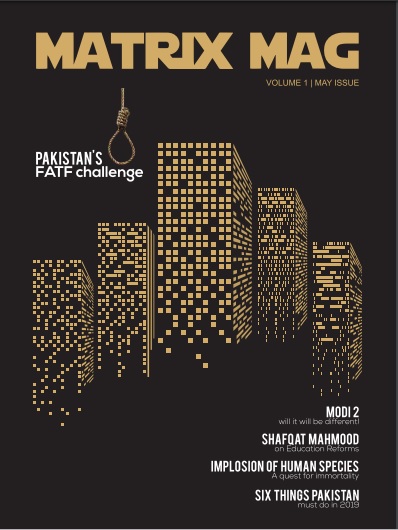Pakistani Prime Minister Imran Khan, on Saturday, phoned his Malaysian counterpart Dr. Mahathir to thank Malaysia for its support of Pakistan’s bid to avoid being blacklisted by the Financial Action Task Force (FATF). It should be noted that Malaysia’s support is critical for Pakistan as it helps stop Islamabad’s blacklisting by the FATF on charges of money laundering and terror financing. After Malaysian support, Pakistan now has three countries behind it which should be enough to avoid blacklisting by the FATF.
For detailed analyses on FATF and Pakistan’s progress, read Matrix Mag’s First Issue here
Dr Mahathir later told the media that Malaysia showed support to Pakistan because Islamabad has escalated its war against money laundering. “We decided based on the rule of law. Not due to animosity. We admit that money laundering is a major problem and it is happening because of the borderless world that allows free flow of capital,” the Malaysian PM said.
Pakistan’s Actions and Progress (until May) under FATF Action Plan
In an in-camera briefing to the National Assembly’s Standing Committee on Finance on April 24 this year, the Ministry of Finance, National Counter Terrorism Authority (NACTA) and the central State Bank of Pakistan gave “satisfactory report” on the ongoing implementation of the FATF Action Plan.
The thrust of their briefing was that Pakistan had finally begun a journey on a path that leads to addressing the concerns of global bodies working to combating financing of terrorism and money laundering. A big announcement on the mainstreaming of all privately run seminaries followed on April 29 by the spokesperson of Pakistan’s armed forces.
The reforms to “mainstream” madrassas are being implemented in three phases and Prime Minister Imran Khan has set up a special committee to work in coordination with organisations running these seminaries to incorporate modern subjects in their syllabus, ISPR’s Major-General Asif Ghafoor told a news conference at military headquarters in Rawalpindi.
The announcement drew ire of many critics because it came from the military and not the prime minister’s office, yet the step itself marked a paradigm shift at the General Headquarters (GHQ) as far as the views on militant groups and their socio-political infrastructure in the country was concerned.
Although long overdue, and a cause of international mistrust on Pakistan’s commitment to counter-terrorism, this announcement apparently was necessitated by the international noose i.e. the Financial Action Task Force (FATF), which requires Pakistan to eliminate all possible avenues of terrorist financing and money laundering under a 27-point action plan.
On March 4th 2019, Pakistan issued the UNSC (Freezing and Seizure) Order. On February 21 2019, under the National Security Committee, the government reinstated an official ban on the organisation Jamaat ud Dawa (JuD) and its charity wing, the Falahe-Insaniat Foundation (FIF). In the process, Inter-agency cooperation between FIA, Intelligence Bureau, NCTA, Police as well as provincial counter terrorism departments (CTDs) has improved. Moreover, the provincial counter terrorism departments have started registering terrorism financing cases.
Additionally the following steps were also taken:
CTDs have also been empowered to investigate money laundering cases.
Joint investigation teams (JITs) have been tasked to conduct financial investigations in all terrorism-related cases under a policy designed by the Combating the Financing of Terrorism (CFT) wing of the National Counter Terrorism Authority.
Details of 7,200 proscribed persons are now publically available, which is maintained under the fourth schedule.
In March, Pakistan launched new guidelines under the UNSC 1267 Sanctions Committee and UNSC 2254 Taliban Sanctions Committee. These guidelines focus on important aspects of CFT in Pakistan regarding designated individuals and entities i.e. asset freezing, increased role of the Financial Monitoring Unit (FMU), instating travel bans, enhanced scrutiny on fundraising etc.
During a meeting chaired by Finance Secretary Arif Ahmed Khan in March 2019, entities namely Da’esh, AQ, JuD, FiF, LeT, JeM, HQN and persons affiliated with the Taliban have now been described as high-risk entities in an effort to comply with FATF requirements.
Additionally, the Securities and Exchanges Commission (SECP) recently announced new measures referencing fresh guidelines pertaining to AML, CFT and proliferation financing
In April, the corporate watchdog Security Exchange Commission of Pakistan (SECP) issued fresh guidelines for non-profit organizations (NPO), insurance sector, stock brokers and the non-banking financial institutions (NBFIs) to combat money laundering and terror financing. These measures included “know your customers” (KYC), regime donors, beneficiaries, partners and employees. It also illustrates characteristics of high risk NPOs with risk parameters.
Soon after the United Nations (UN) placed Jaish-e-Mohammad (JeM) leader Masood Azhar on its global terror list (MAY 1, 2019), the SECP directed all non-banking financial companies and other regulated entities to immediately freeze JeM’s investment accounts if any.
Malaysia’s support for Pakistan clearly indicates that the aforementioned steps taken by Pakistan indicate towards seriousness in Islamabad to counter money laundering and terror financing. Pakistan now hopes that with these measures, it will succeed in convincing the FATF that all major points mentioned in the Action Plan are being properly implemented.
(For detailed analyses on FATF and Pakistan’s progress, read Matrix Mag’s First Issue here)




